- Home
- Gerald Hammond
Snatch Crop
Snatch Crop Read online
SNATCH CROP
Gerald Hammond
© Gerald Hammond 1991
Gerald Hammond has asserted his rights under the Copyright, Design and Patents Act, 1988, to be identified as the author of this work.
First published in 1991 by Macmillan London Limited.
This edition published in 2018 by Endeavour Media Ltd.
Table of Contents
Chapter One
Chapter Two
Chapter Three
Chapter Four
Chapter Five
Chapter Six
Chapter Seven
Chapter Eight
Chapter One
When Sir Peter Hay, who is godfather to me as he is to half my friends, practically invites himself to one of Mum’s little dinners, I am both pleased and wary. I like the old boy, or even love him in the purest and most platonic sense of the word. He’s good company and he has the proverbial heart of gold. But he does head-hunt rather a lot and when the tasks to be carried out are out of the ordinary he has been known to cast an eye in my direction.
At first, I thought that I was off the hook. Mum, presiding in her usual placid and competent way over the table, had also invited a Mrs Thrower and her daughter, who had just moved into a rented house nearby but were comparative newcomers to the district. Mrs Thrower was new to me, a tall and rather regal woman with black hair and perfect skin but just a trace of a moustache. The daughter, Delia, I had met once before. She was a childish but quite pretty twelve-year-old, fair-haired but otherwise a younger miniature of her mother. She had tried to attach herself to me but when, with the best of intentions, I had offered to take her shooting or rabbiting with Uncle Ronnie’s ferrets, she had looked at me as though I were the ferret and she a baby bunny and she had gone away and developed a crush on somebody else instead, to my relief.
Sir Peter was devoting himself to Mrs Thrower. Dad, on my other side, was talking to me about the Scottish FITASC Championship and I was listening with half my mind while the other half thought I was going to miss Briesland House. Late sunshine was glowing on the glass and silver that Mum and I had polished so lovingly and which was throwing highlights on to the panelling. I had spent my life in that house. But enough of the conversation between Mrs Thrower and Sir Peter filtered through for me to gather that there had been a recent separation in the Thrower family and Sir Peter, who seemed to have some connection with the absent Mr Thrower, was delicately hinting at the possibility of a reconciliation while Mrs Thrower was hinting, with equal delicacy, that he should mind his own damn business. I decided that Sir Peter, who has a finger in every pie for miles around, had appointed himself peacemaker and that Mum, as well as being his accomplice, was at her self-appointed duty of making the newcomers feel at home.
Mum was left with the task of entertaining Delia and she was making heavy weather of it. The girl seemed to have little interest in anything but the boys at her school and the latest trend in teenage fashions, neither being a subject in which Mum had more than a polite interest.
I decided to help out. ‘What a pretty bracelet,’ I said. And so it was. It was a cheap thing of tiny glass beads, but in unusual shades of a lavender colour.
My words were the signal for a change of topics and partners. Delia looked down at the bauble. ‘Daddy gave it to me,’ she said softly.
‘Brought it back to her from Turkey or somewhere,’ her mother explained. I noticed that bitter lines were etched around her mouth. ‘Quite unsuitable, of course, but it’s more than I ever got from him in the way of jewelry.’
Mother, who was wearing a rather good diamond bracelet, tried to hide it under the table and then got up to serve the sweet.
Sir Peter, abandoning his role of mediator, spoke across the table to Dad. ‘I’ve been trying to make sense of my shoot finances,’ he said. ‘It looks as if I’ll have to let three days next season to pay for next year’s birds.’
‘Don’t look at me,’ Dad said. ‘I can’t afford to pay commercial prices for a day’s shooting and come away with a brace of birds that have cost me about a hundred quid each. That’s expensive poultry.’
Either of them could well have afforded almost unlimited shooting. Sir Peter was the biggest landowner for miles around and Dad was doing very nicely thank you from the gunshop and from his speciality of dealing in antique firearms. But I knew what they meant. Sir Peter ploughed back his considerable income into the land he owned and would have found something immoral in devoting it to his own pleasure, while Dad, like a typical Scot, without being miserly hated to pour money down the drain. He would rather buy a diamond for Mum or a new trap-gun for me than invest in what would soon be no more than a pleasant memory.
‘If I looked at you,’ Sir Peter said, ‘it wasn’t as a potential client but as a fellow sufferer.’
Dad nodded sadly. He and Uncle Ronnie run a small family shoot. ‘The game dealer’s price for pheasants is just ridiculous,’ he said.
Again, I knew what they meant. Being Dad’s daughter, and Dad being Dad, I had been taken beating not long after I could toddle and had been taught to shoot as soon as I could be trusted to handle a 28-bore safely. In recent years, the Continental market was glutted with pheasants and the British housewife still considered game-birds to be luxury food, forgetting that they were free-range and unadulterated. For this, the trade was largely to blame. The game dealer paid a price for shot pheasants which was a small fraction of what the birds had cost to rear and release, but this saving had never been passed on to the customer. By the time the birds turned up in the poulterer’s window, still in the feather, the real value had been more than restored. The loss to the shoots had to be made up from the pockets of the shoot owners, syndicate members or visitors, and it seemed to me that, if those men ever decided that they were fed up with being had for suckers, the loss to both the Scottish economy and ecology would be serious.
‘I have been thinking,’ Sir Peter said. Dad and I looked at him and even Mum’s flow of conversation checked for a moment. Those words usually meant that a conclusion had been reached and something drastic was about to happen.
‘Go on,’ Dad said.
‘Two adjacent units are vacant in the industrial estate. Choice Chicks went bust during the salmonella scare and the meat pie factory’s closing. BSE in beef,’ Sir Peter added in unnecessary explanation. He looked down at his sweet for the first time. ‘Ah. Apple tart! Nobody ever caught anything from an apple. Shame that you can’t say as much for a tart.’ He paused and harumphed at his own joke. Mrs Thrower looked shocked. Delia just looked blank.
‘Both units are still equipped. So here’s an opportunity. What we need is a co-op of the major shoots. And the minor ones, for the matter of that. Cut out the middleman and start a company to popularise the pheasant. Oven-ready, free-range birds at affordable prices. We even have a ready-made outlet. The fish-vans are being hit by the cuts in North Sea quotas.’
There was silence for a few seconds. Mrs Thrower was still rattling on about the difficulties of bringing up a daughter without a man in the house, but that was no more than a sort of verbal Muzak and hardly counted.
‘What about capital?’ Dad said at last.
‘Not a great deal required if the factories are rented. The shoots would put up what was needed. Others would soon want to join in when they saw that they could get a better return on their bag, and late-comers could pay a premium to pay off the first investors. Two commercial organisers and four private estates are already keen. How about you?’
Dad had already made up his mind. ‘I’ll have to speak to Ronnie and Wal,’ he said. (Wallace was his partner in the business and a member of the shoot.) ‘If the figures look good, we’re in.’
The subject seemed to be exhaust
ed. I turned my attention to the other half of the table but Delia, despite her mother’s best efforts, was now monopolising the conversation. She was rattling on about some birthday party, to the acute boredom of her listeners.
Sir Peter, however, was still riding his new hobby-horse. ‘Some of the staff are willing to stay on or come back,’ he said. ‘But, of course, we’ll need an overall manager. I thought that you, Deborah, might take it on.’
Caught with my guard down, I nearly said that I was too busy. That excuse would have been demolished with contumely. For years, Dad and Sir Peter had been in the habit of tossing me in off the deep end whenever there was some tedious management chore to be undertaken, but for the moment I had made a comfortable little nest for myself in the local scene. I trained as a engraver but I can do most jobs around the gunsmith’s bench and had been helping Dad out whenever that side of the business, or any other, called for another pair of hands. My other so-called job, at the Pentland Gun Club, had largely been taken over by the new Secretary and I was only conducting a few coaching sessions a week and organising competitions along lines which had, by now, become so set that any change provoked complaints by the dozen.
‘But I’m getting married in August,’ I said weakly. ‘That’s next month,’ I added, realising for the first time that events were rushing at me.
‘Plenty of time,’ Sir Peter said. ‘We won’t get going until late October. Any wild birds of respectable size will probably be shared among the guests and what pheasants you’re offered before November will either be immature or badly shot up. Or they’ll be birds frozen and held over from last season.’
‘But why me? I don’t know anything about the poultry trade.’
‘You know all the keepers,’ he pointed out. ‘You, if anybody, can get them to deliver good birds that aren’t turning green or covered in flies’ eggs. We’ll have plenty of competent work-staff. What we need is somebody to pull it together and make it work. I’ve seen you in action before now. You can organise.’
‘And you love bossing people around,’ Dad said. He sounded amused. Evidently he was not going to help me out by pleading that my services could not be spared.
‘Not the keepers,’ I said. ‘They’re more used to shouting at me to keep in line.’
‘You do yourself less than justice,’ said Sir Peter. ‘You’re good at getting people to jump through hoops.’
‘Only men,’ Mum said. She had been taking it all in despite Delia’s prattle. She was laughing at me too.
‘What’s more,’ Dad said, ‘you’ll need a proper salary when you and Ian set up house.’
‘It’ll be very seasonal,’ I objected.
‘If it is,’ Dad said, ‘you’ll be able to keep up your competition shooting. You can’t expect Ian’s salary to stretch that far.’
‘It may not be so seasonal,’ Mum said. ‘Is there a good cold store?’
‘Yes indeed,’ said Sir Peter.
‘You’ll get a proportion of birds which have been shot from too close or chewed by a beater’s dog. Boil them down into pheasant gravy, buy up pigeon and rabbits outside the game season and make game pies.’
‘They’d have us under the Trades Description Act,’ I said. ‘Pigeon and rabbit aren’t game.’
‘I think we’d be all right if the contents were printed on the bag,’ Sir Peter said thoughtfully. ‘I’ll find out.’
Nobody bothered to ask me whether I was going to take it on. The matter seemed to be settled.
‘Pigeon and rabbit pie with pheasant gravy,’ Mrs Thrower said thoughtfully. ‘It doesn’t sound very tasty.’
Sir Peter smiled at her, almost laughing. ‘What did you think Mrs Calder gave us for the main course?’ he asked her.
‘That? But it was delicious!’ Mrs Thrower said. Her tone suggested that Sir Peter had to be mistaken if not lying.
‘I’m glad you enjoyed it,’ Mum said. ‘I’ll give you the recipe if you like. Coffee, anybody?’
I tried to explain that I didn’t want a job, I just wanted to be a good wife and, in the fullness of time, a mother, but nobody seemed to be listening.
*
My wedding day arrived in a rush and found us more or less prepared. It was as much of an endurance test as I had expected.
Ian and I had been ‘going steady’, as they say, for several years. We enjoyed each other’s company, shared fits of helpless laughter at the same trivia and felt a strong physical attraction. If that is love, then we loved. Marriage seemed an inevitable goal.
Ian Fellowes had been a detective sergeant with Lothian and Borders, stationed in Newton Lauder but responsible to Edinburgh. When, at long last and after considerable campaigning and politicking by the local Superintendent, it was decided to upgrade Criminal Investigation in the area and Ian went up to Inspector, with a detective sergeant of his own and two constables thrown in as makeweights, there seemed to be no reason to wait any longer. He was now settled and almost adequately paid.
We would have been quite happy with a civil ceremony. Marriage, after all, is no more than a contract to stay together and be faithful, which is exactly what we intended to do. Mum had conscientiously dragged me to kirk and Sunday school during my childhood and for a few years I had felt the eye of God following me around so unblinkingly that I had taken to undressing in the dark. And then, one day, I had suddenly said to myself, ‘But this doesn’t make sense,’ and that was an end to it. So the idea of being gift-wrapped and ‘given away’ to my chosen man seemed impossibly archaic and sexist.
But Mum had made up her mind that her only baby was going to have the church wedding, which, for some reason that I never got to the bottom of, she had never had for herself. Dad had been paying into an endowment fund for more than twenty years and he topped it up by selling one of his favourite muzzle-loaders, a flintlock – by Manton no less! We went through with it and suffered all the ritual embarrassment. I was not even strong-minded enough to refuse the services of the insipid Delia as bridesmaid. ‘Poor child,’ Mum said, ‘she doesn’t have a proper father any more,’ and that was that. Dad, looking like the more handsome sort of elder statesman in his hired morning suit, gave me away while Delia, with her fair prettiness, looked as if she had been sculpted out of ice-cream.
The church was packed. Dad, who gets expansive when he has taken a social dram, had been issuing invitations broadcast and as I went up the aisle on his arm I thought that I recognised the backs of several quite unexpected necks. Returning, this time with Ian, I could see the faces and decided that Dad must have invited everybody who looked even vaguely familiar.
Ian’s colleagues – including, astonishingly, Superintendent Munro – formed a guard of honour. At the hotel, we managed to smile through most of the speeches. Sir Peter, looking almost smart in his best kilt, made by far the best speech, lasting less than a minute, and, as they say, brought the house down. My Uncle Ronnie, who was not scheduled to speak but who had been mixing champagne and whisky with the occasional, accidental sherry, then got to his feet and spoke at some length in a dialect so thick that few of those present could follow him. For this I was thankful as most of his speech was composed of scurrilous anecdotes from my past. How my well-spoken mum came to have a brother with the appearance and the social grace of a demented gorilla still amazes me.
We would have sneaked away as soon as the meal was finished, leaving the company to enjoy our wedding in their own ways. Unfortunately it had leaked out that we were spending the first night within a taxi-ride (the exact destination being a well-guarded secret) and any attempt at escape was sternly resisted. Ian, who is a rotten dancer but almost good-looking in his morning suit, led me out and soon most of the company was on the floor. Dad, I noticed, was dancing carefully with young Delia, who was better at it than he was, while her mother had been dragged, protesting, on to the floor by Uncle Ronnie and was, as usual, exuding an aura of Suffering Bravely.
Several duty dances later, I was hoping at least to get back t
o the top table and kick off the bridal slippers, but a guest claimed me. This was one of the surprise attenders – Sir Humphrey Peace, the owner of a medium-sized estate to the south of the town. I had in the past gone beating for him, shot with him and even, with Dad and Mum, dined at his house, so that I knew him without ever having got to know him, if you can make sense of that. In a lean and rather delicate way he looked and acted very much as part of the Establishment. I would have put his reserve down to his being one of the many older men who are shy of younger women, except that the men of my family seemed similarly to be kept at arm’s length. Snobbery is so rare in the Borders that it never occurred to me that he might just feel that we were beneath his notice. His presence at my wedding (preceded by a set of crystal sherry glasses) could only be explained by the fact that Dad is a useful person for the shooting man to keep in with.
Sir Humphrey steered me several times around the floor without saying a word. When the band came to a halt, he spoke for the first time. ‘Wish you every happiness,’ he said abruptly. ‘Sadly, I’ll have to leave now. Business calls.’
We had come to a halt near the door and, as he turned towards it, another of the surprise guests entered, apologising over his shoulder to Dad for missing both the service and the meal. I had only set eyes on Nigel Farquharson, the laird of Boyes Castle many miles to the north, three or four times before but I recognised him immediately. There was no mistaking the large, big-bellied figure nor the hooked nose and the eyes half hidden by the puffed flesh. The two men almost collided and then looked at each other blankly.
‘You do know each other?’ I asked.
‘No,’ Sir Humphrey said. ‘Should we?’
I performed a quick introduction. They shook hands guardedly.
There was an awkward pause.
‘I think,’ Mr Farquharson said loftily, ‘that you once shot a friend of mine.’
This was about as complete a put-down as I have ever heard, but Sir Humphrey looked genuinely amused. ‘Then he must have moved away from his peg,’ he said. He sounded, for him, quite genial.

 Home to Roost
Home to Roost A Dead Question
A Dead Question Twice Bitten
Twice Bitten The Curse of the Cockers
The Curse of the Cockers In Loving Memory
In Loving Memory Illegal Tender (Three Oaks Book 12)
Illegal Tender (Three Oaks Book 12) Cold Relations (Honey Laird Book 1)
Cold Relations (Honey Laird Book 1) A Brace of Skeet
A Brace of Skeet Silver City Scandal
Silver City Scandal Sauce For the Pigeon
Sauce For the Pigeon Cold Relations
Cold Relations Hook or Crook
Hook or Crook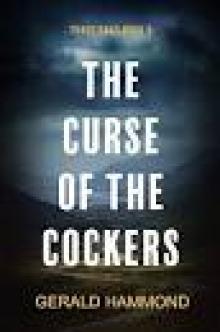 The Curse of the Cockers (Three Oaks Book 5)
The Curse of the Cockers (Three Oaks Book 5) Snatch Crop
Snatch Crop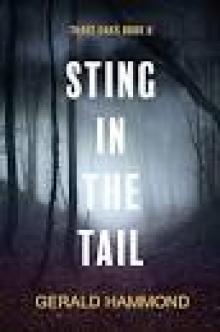 Sting in the Tail (Three Oaks Book 6)
Sting in the Tail (Three Oaks Book 6) A Dead Question (Honey Laird Book 2)
A Dead Question (Honey Laird Book 2) In Loving Memory (Honey Laird Book 3)
In Loving Memory (Honey Laird Book 3) Thin Air
Thin Air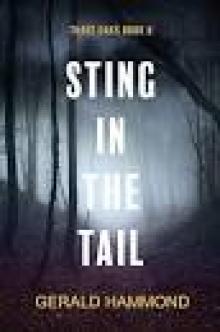 Sting in the Tail
Sting in the Tail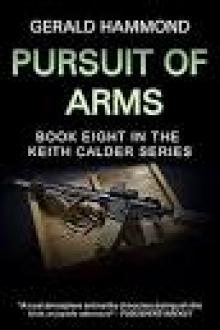 Pursuit of Arms
Pursuit of Arms The Game
The Game Give a Dog a Name (Three Oaks Book 4)
Give a Dog a Name (Three Oaks Book 4) Fair Game
Fair Game The Executor (Keith Calder Book 10)
The Executor (Keith Calder Book 10) Whose Dog Are You? (Three Oaks Book 2)
Whose Dog Are You? (Three Oaks Book 2) Mad Dogs and Scotsmen (Three Oaks Book 7)
Mad Dogs and Scotsmen (Three Oaks Book 7) Cousin Once Removed
Cousin Once Removed The Worried Widow
The Worried Widow A Shocking Affair
A Shocking Affair Dead Weight (Three Oaks Book 11)
Dead Weight (Three Oaks Book 11) Whose Dog Are You
Whose Dog Are You The Revenge Game
The Revenge Game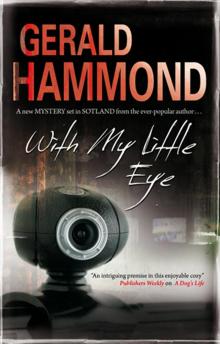 With My Little Eye
With My Little Eye Doghouse (Three Oaks Book 3)
Doghouse (Three Oaks Book 3) In Camera
In Camera Bloodlines (Three Oaks Book 8)
Bloodlines (Three Oaks Book 8)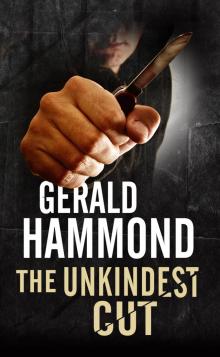 The Unkindest Cut
The Unkindest Cut